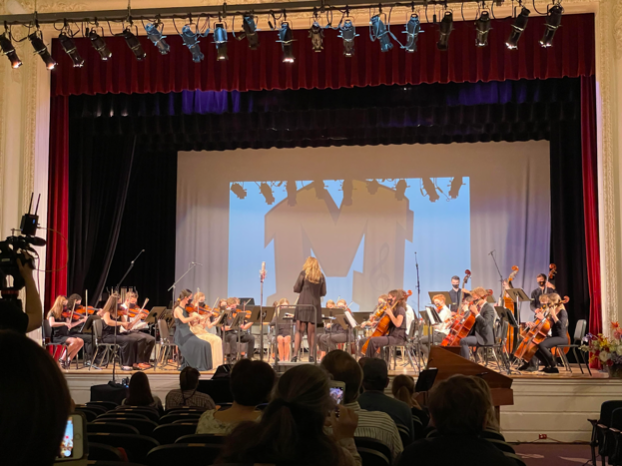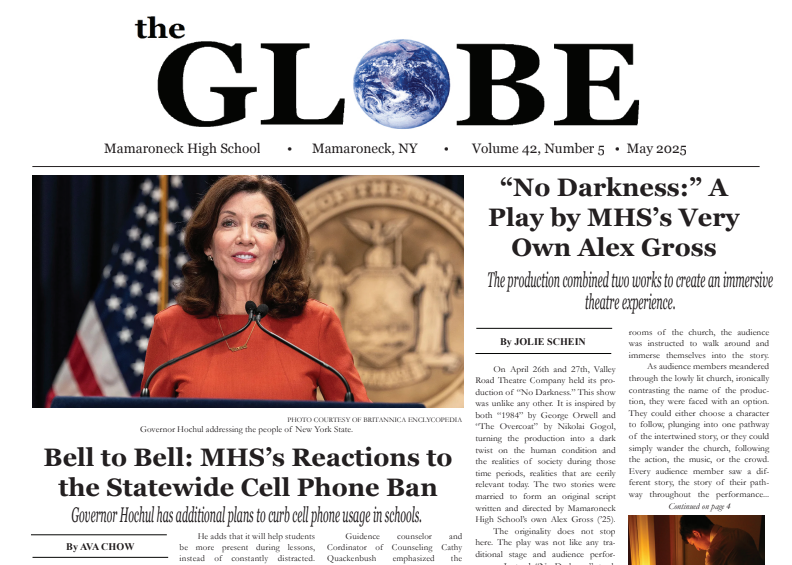Mamaroneck Makes Music from Afar
How the MHS Music Department perservered throught the pandemic.
Photo Courtesy of Jeff Carpenter
The MHS Chamber Orchestra performs at the first in-person concert of 2021.
June 23, 2021
Whether for students, teachers, or musicians, the pandemic changed the lives of everyone at Mamaroneck High School. In an attempt to adjust to the new lifestyle, the music department was left in a difficult situation. Band students were asked to wear masks or bell covers while playing their instruments and standing 12 feet apart from one another. Chorus students had to use individual microphones so they could hear one another from across the room. Orchestra students had to work out difficult pieces on Zoom for half the year while not being able to hear the other half of the orchestra. Through all of the obstacles, the music department managed to persevere through a difficult time — learning and growing as musicians.
Coming into the school year, both teachers and students were aware that there would have to be adjustments. The 33 percent model in the first half of the year made teaching nearly impossible. As the band teacher, Timothy Hooker, described it, only a handful of musicians would be in class at once due to the ever changing schedule. Never knowing who would show up was like “Russian roulette.” Each period was different every day, all with different instruments, and all with different skill sets. Every student had to be 12 or more feet away from others. The flute players were boxed into shower curtain-covered cubes. Transitioning to the 50 percent model made teaching a little more normal, but there were still some difficulties. Amanda Gundling, a chorus teacher, described it as “teaching two classes at once — one group on Zoom and one in person.” When teaching a class one day, she might have had three sopranos, two altos, and one bass, but a completely different lineup the next day. The “uneven voicing” made it challenging to “get down each part.” Gundling made it so that her students were only singing in 15 minute intervals to minimize exposure. Because of this, she found that she was able to focus on more music theory with her students, going over time signature, note names, etc. The chorus students also adapted to projecting their voices through their masks, as this was never an issue before. When the school opened up to 100 percent, the music started coming to life as there was something to strive for– a concert.
During a regular school year, the music department has winter and spring concerts, but this year, the pandemic changed that. It was only a few months ago that the music department found out they could hold a concert by the end of the year, but only under certain guidelines. Elyse Gellert, the orchestra teacher, explained that her students would be “maintaining a 3-foot distance between string players, performing in masks and designating students one per stand.” As orchestra students, they are not “mandated to be six feet apart and are not at a high risk when we perform,” unlike Gundling and her chorus students, who do have to be six feet apart. The choir performed on stage and on risers, something they had never done before. There were also new overhead microphones to help the sound be more even, an addition that will likely be used in the future. Hooker and his band students followed a similar distance of 6 feet, but made sure every player had some sort of protection — whether that be a face shield for the flutes, a mask cover for the clarinets, or a bell cover for the trumpets. The concerts took place on the 3rd and 9th of June, and each student was allowed two guests. This concert was no easy feat, however, it was extremely rewarding and monumental.
All year the teachers have worked tirelessly to keep the department up and running, and the students fought just as hard. A double bass player, Seth Julie (‘22), claimed that it was challenging to make music over Zoom and online in general. “It’s very hard to experience playing with others when you can’t hear, see, or even be in the same room as them.”
Sophie Brause (‘23), a flute player, noted that it was a struggle not playing as a band for the whole year and having to work around the schedule changes. Brause commented that it is “even more special to play with so many people that you wouldn’t have otherwise.”
For cellist Lulu Tantillo (‘21), the biggest challenge was staying organized. She noted that “everyone had to be responsible for their own sheet music which was a change I had to adjust to.” Tantillo also pointed out the “stress of having to quarantine. Fluctuating rules about COVID-19 regulations in school made any class a lot less stable than it would have been in a normal year.” Being a senior, Tantillo was honest that she had “low expectations” going into the school year. She notes, however, that “it ended up being a great year all things considered.” Tantillo was excited for the concert as she had not “been able to play for a big audience in ages” and was happy “we were able to pull one [a concert] off before the end of our senior year.”
Being a musician in a pandemic has taught these students and teachers a lot of valuable lessons. Julie notes that it has taught him the “importance of being creative and always being willing to try new things.” While in quarantine, Julie tried to pick up the guitar and attempted new ways of performing using video recordings. He noted that he is looking forward to “making more music in person in large and small ensembles.” This year, he missed the “spontaneous moments in the orchestra and band rooms” where he could pick up an instrument and play with his peers.
Brause learned how important it is to stay motivated as a musician. “Even though we didn’t have many opportunities to perform the music we learned, we found new ways to set goals for ourselves and grow our love for playing.” Gundling came to understand that “the community is more important than the music making — without a community, there is no music.” She is looking forward to being back in a classroom, and sharing “new experiences with my students.” Hooker noted that some things that are “bigger than all of us and all we can do is try to do our best with what we have.”
The music department overcame some of the most difficult challenges this year, and the effort from everyone does not go unnoticed. Even if it was one period a day, many students took it for granted in the past. This year opened their eyes to how crucial music is in their day to day life, taking away a greater appreciation than they had before. Gellert claimed that “the importance of art and expression was never lost at MHS and this year, though different in many ways, still proved to be a musical and memorable one.”






